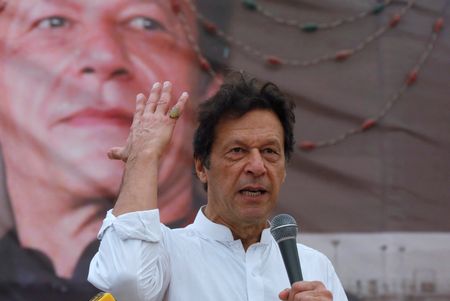
Imran Khan’s Sinking Ship and its Impact
 Fri, 08 Apr 2022
| Reading Time: 5 minutes
Fri, 08 Apr 2022
| Reading Time: 5 minutes

Pakistan’s reputation as a democracy just got retrieved after the Pakistan Supreme Court in its judgment turned the clock back, just as it should have. The Opposition and the Bar Council had filed a case in the Supreme Court against the refusal of the Deputy Speaker of the National Assembly to allow a vote on an Opposition motion of no-confidence, on the premise that the entire issue was manipulated by a foreign power against the security of the nation. Imran Khan had then recommended to Pakistan President Arif Ali, that the National Assembly be dissolved and fresh elections be conducted.
The Supreme Court’s five judge bench has done well to restore legitimacy by dismissing the Deputy Speaker’s action and ordering a vote in the National Assembly on 9 Apr 2022. It’s not just that. The Supreme Court has actually gone further to ensure that there is no further constitutional violation through manipulation by specifically stating that the Opposition would be allowed to move a no-confidence vote against the Imran Khan government in the lower house at 10 am on April 9. Apprehending further mischief, it also mentioned in its judgment that – “the Speaker of the National Assembly cannot adjourn the session till the vote of no-confidence is moved on the floor of the house”.
Imran Khan and his government too got restored to their official status to face the no-confidence motion. However, what needs analysis is why Imran and his party, Pakistan Tehreek e Insaaf (PTI) decided to take such an arbitrary action. This will also help in getting an insight into Pakistan’s future political interplay and power games. There appears nothing above board in Pakistan, except the brilliant judgment by the Supreme Court which will continue to be quoted extensively and provide much greater legitimacy for Pakistan’s democracy.
Pakistan’s politics are most unpredictable with alliances and equations changing by the day. The PTI was till recently the favourite of the Pakistan Army but personality clashes and personal ambitions placed well above national interests have invariably upset things in Pakistan, where no elected government has ever completed a five-year term. Having experienced the two mainstream parties, PML(N) and PPP, over an elongated period, the Pakistan Army, which governs Pakistan by proxy and controls the core domains of security, foreign policy and to some extent even economic policy, decided to experiment with the untested PTI.
Imran Khan looked like a good candidate. He was an iconic figure due to his achievements in the field of cricket, having turned things around in the 1992 cricket world cup in Australia, which led to Pakistan lifting the trophy. Imran Khan was perceived as an educated and well-respected citizen who could greatly uplift Pakistan’s international image and internally restore confidence in Pakistan. Since his party did not have a political presence everywhere in Pakistan, his becoming the ‘selected Prime Minister’ would provide the necessary leeway for the Pakistan Army to exercise far greater control over administration.
Things didn’t work out that way once Imran Khan got elected (read selected) as Prime Minister. Imran Khan’s ambitions were far greater than what the Pakistan Army had assessed. It is he who had commenced with the phenomenon of ‘sit in’ around the capital city creating unprecedented forced lock downs much before the Coronavirus pandemic. Once in power he accorded a three-year extension to Gen Bajwa but later included a disruptively confrontational attitude against the Pakistan Army with the probable perception that his gravitas, public image and confidence would see him through.
If he had the ability to pull the Pakistan economy out of the woods, he would have probably succeeded in his confrontation with the Army. The one person who could have done a Houdini for him was Atif Mian, the Princeton economist and much respected academic who was appointed as a Member of the Economic Advisory Council. No doubt Atif Mian would have subsequently moved much higher in the Pakistani power hierarchy with his well-established credentials. However, when obscurantist groups pressured Imran Khan against the well-known economist on grounds that he was a Qadiani, he chose to dismiss him rather than convince the nation on what Atif Mian could probably achieve for it. It was poor judgment, the kind of judgment that Imran Khan has been displaying for some time now, on the basis of what is rumoured as advice from his spouse who apparently is some kind of expert in black magic.
It is his confrontation with Gen Bajwa that has brought Imran Khan to grief. He tried creating a division within the Army by resisting Gen Bajwa’s recommendation to post out Lt Gen Faiz Hameed, former DG ISI to Peshawar as GOC 11 Corps. Bajwa had his way but that wasn’t enough of a lesson for Imran Khan on the limits of power of a Pakistan Prime Minister. Imran has not learnt to be a quick learner and adaptor to realpolitik, something any civilian ruler in Pakistan needs to learn very early. It’s this quality bringing him to grief more frequently.
Has Imran Khan learnt his lessons from the events of the last few days? Rumours are afloat again in Pakistan that he may find ways of wriggling out of this directive of the Supreme Court too by declaring an economic emergency in view of many Pakistan economic parameters indicating a potential meltdown. Anything such as this could be possible only with the endorsement of the Pakistan Army and the latter has shown no propensity towards it.
It is possible that Imran Khan’s apparent confidence stems from some kind of a belief that he has the support of a segment of the Army; if it is his belief that Lt Gen Faiz Hameed can be his trump card against the Army Chief Gen Bajwa, he has to probably think many times over. It is doubtful that the one institution which has kept Pakistan together will fall prey to Imran Khan’s machinations on the basis of personal ambitions of individual General Officers below the Army Chief.
There are positives emerging from this situation with strengthening of some democratic norms and institutions which is good for Pakistan. If Imran Khan loses the vote for confidence in his leadership, he won’t be able to recommend dissolution of the National Assembly and fresh elections. He seems to be extremely keen on early elections which he views as something beneficial to him. Reports from Pakistan do indicate that in a free and fair election he could just return with a majority.
The Opposition on the other hand wishes to see the elections delayed as much as possible, to allow a new Government to find its feet and roll back some of the electoral reforms set in motion by Imran Khan. Opposition unity in Pakistan, like anywhere else, can be something very fickle. There is general bonhomie at present, but the PPP and PML(N) are not really the best of friends and their Coalition Government could run into many obstacles in the future, including the extension to be accorded to Gen Qamar Bajwa.
The constitutional crisis in Pakistan has fortunately occurred at a time when the situation in J&K is stable and the LoC ceasefire has held well for over a year. It may be premature to expect any positive developments on the India-Pakistan front unless there is a stable government in Pakistan. Even if the Opposition ends up with a Coalition Government led by Shehbaz Sharif, there is no guarantee that the Pakistan Army will favour a détente with India, even though Gen Bajwa has often spoken of it and done so recently at the Islamabad Security Dialogue too.
For Pakistan it will be extremely useful to usher in a period of good relations with India especially in view of the precarious economic situation. However, to achieve that it has to be convincing in its approach and sincerity with reference to India’s requirement of ‘talks and terror’ not going together. With the world transforming through to a potentially fresh set of geopolitical equations, this may be an appropriate time to consider encouraging such a change in the Subcontinent too.
************
Disclaimer
The opinions expressed in this article are the author’s own and do not reflect the views of Chanakya Forum. All information provided in this article including timeliness, completeness, accuracy, suitability or validity of information referenced therein, is the sole responsibility of the author. www.chanakyaforum.com does not assume any responsibility for the same.
Chanakya Forum is now on . Click here to join our channel (@ChanakyaForum) and stay updated with the latest headlines and articles.
Important
We work round the clock to bring you the finest articles and updates from around the world. There is a team that works tirelessly to ensure that you have a seamless reading experience. But all this costs money. Please support us so that we keep doing what we do best. Happy Reading
Support Us





















POST COMMENTS (3)
Kalidan Singh
ASHOK IYER
Anisha Das